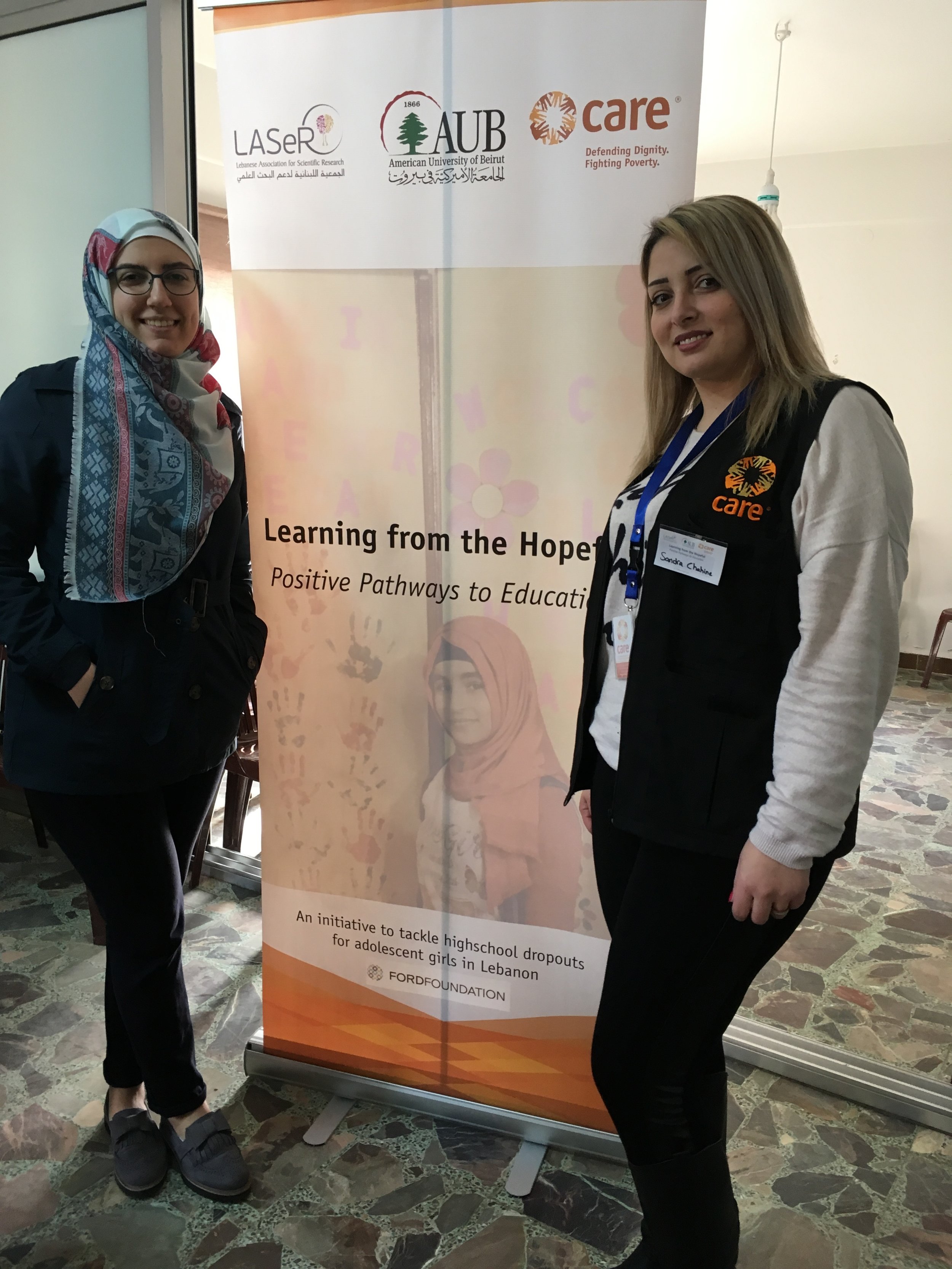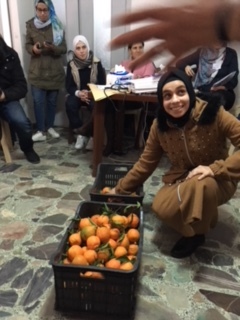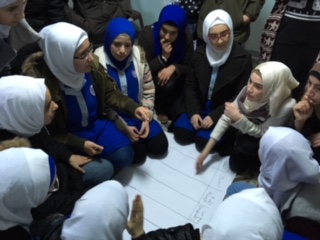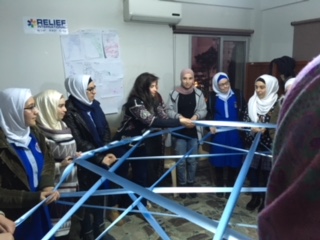Author: Monique Sternin,
Positive Deviance Pioneer and Consultant
An initiative by CARE International, in partnership with American University of Beirut (AUB), local NGOs, high schools and locals communities, to tackle low enrollment rate and high secondary school dropouts rate among adolescent Lebanese and Syrian refugee girls in Tripoli, Lebanon through the use of the Positive Deviance approach.
Only 57% of Lebanese girls, and a mere 3% of Syrian girls, are currently registered in secondary education in Lebanon, leaving the country far from achieving Sustainable Development Goal (SDG) 4’s target to ensure that all girls and boys complete primary and secondary education. Two-thirds of students are in public schools (compared to one-third nationally) while Tripoli has the highest dropout rate (16 percent) for those 13 and older; the rate rises to around half at high school, according to many indicators, and this percentage has risen since 2011.This is a complex problem exacerbated by the Syrian conflict next door, high unemployment and security issues for girls in Tripoli and the coping strategy to marry girls before high school.
By using the Positive Deviance approach, this pilot project aims to obtain valuable insights into why a small group of girls aged 15-18 advances to secondary education and what they actually do to be successful where most other girls in same and sometimes better situation fail.
Note: Since the life experience of Syrian refugee girls and Lebanese girls is different, it was decided to conduct PD Inquiry separately in these 2 groups and their communities.
The findings of the demonstrably uncommon but successful strategies and behaviors from those girls will subsequently be used to create and secure pathways back into secondary education for those girls not in school or at risk of dropping out. From the powerful use of the PD methodology as a community mobilization process it is expected that this group of girls and their supportive families will become change-makers who can influence their own communities and serve as mentors for other girls at risk of leaving school before developing the skills and conceptual knowledge needed to pursue meaningful learning and life options.
The strategic objectives of the project using the PD approach are to:
Enhance communities knowledge of innovative and resilient solutions in overcoming the systematic barriers to continuing education;
Empower key community members and the positive deviants with tested solutions that promote continuing education; and
Reduce barriers to continued education through advocacy efforts led by positive deviants and key community members.
PD Syrian adolescent girls selection criteria include being 15 to 18 old, enrolled in public secondary school (grade 10th, 11th or 12th), dropped out but came back, high vulnerability (social & economic), In Lebanon from 2011 on, no external financial & paid tutorial help.
The stakeholders include the girls & their family and their formal & informal networks, as well as the high school staff (principals & teachers) and local NGOs.
Examples of PD behaviors and strategies found through a PD process so far:
Syrian Girls Group:
Obstacle #1: Language (English & French are the languages used in high school, not Arabic)
Some uncommon but successful solutions (PD solutions):
memorize 10 words of English every day
use google translator
watch foreign movies and read foreign story books
Speak English in front of mirror and practice the language with friends
Obstacle #2: Stigma and bullying at high school
Some Uncommon but successful solutions:
Befriending Lebanese girls
Befriending the class leader
Helping Lebanese girls with their Arabic homework.
Enlisting Family support (PD mothers)
Obstacle #3: Girls’ parents are not able to pay school fees and registration
PD Girls tutor kids in their neighborhood to afford their education or work in part time jobs on the weekend (waitress in restaurant).
Parents borrow money from neighbors or seek for financial aids from community leaders in their area.
Parents agree with principals on paying registration fees by small installments.
Few principals with teachers agree on gathering money to cover fees for the most vulnerable girls to help keeping them enrolled.
Mothers Group:
Obstacle #1: Lack of security
Some uncommon but successful solutions
Build our daughters self-confidence
Convince fathers & others in community about importance of girls’ education and negative effects of early marriage “education first & then we can talk about marriage”
Obstacle #2: Not knowing how to enroll daughters
Some uncommon but successful solutions:
Rely on local women network to get inform others of the necessary documents
Have a supportive network with neighbors from same region in Syria .
The qualitative results showed that PD girls are students who stayed enrolled in high school despite the various obstacles they faced.
The obstacles could be categorized into financial situation of the family, social problems in the family, school difficulties, health problems or registration challenges.
The financial situation of the family could be assessed by the profession of the head of the HH, the status of the residence, ability to pay enrollment fees and other school fees, amount of allowance provided to the girl, whether the girl has a part time job or not, and the quality of the girl's clothes. In order to overcome their difficult situation, the families seek assistance from the school or the municipality or they borrow money to pay school fees. Moreover, examples of social problems include separation/divorce of the parents, member of family or girl has chronic health problem or disability, the girl has to help in HH chores, the girl has to take care of her siblings or an old/ill person.
PD girls are determined to continue their high school education while they are performing house duties and despite their health problems.
With respect to school difficulties (sciences, memorizing humanities), they are similar among Lebanese and Syrian girls with the latter facing more difficulties learning the curriculum in English/French. Girls faced difficulties transitioning from middle to high school, from a girls-only to a mixed school, and from a private to a public school. Girls came up with many creative solutions (using their imagination, illustrating the lesson, studying in front of the mirror, etc...) to improve their school performance. They relied on Internet resources (Google Translate, Google Images, YouTube, etc...) to improve their understanding of school material.
Finally, Syrian girls face challenges when registering in high schools for different reasons: lack of identification papers, unavailability of spaces, and delayed registration time specified for Syrians. The main solution for this problem was a coalition formed by a mother with some girls who communicated with the Minister of Education to get enrolled in a public high school in Tripoli.
Lessons Learned/What Worked So Far:
Inviting all the stakeholders: initially only the girls and their families were involved in the project but it became clear that the 7 public high schools in Tripoli has to be part of the project as well, since PD girls identified some “PD” teachers –who helped them with their homework or designed specific classroom exercises for the Syrian girls.
Describing/introducing the issue ( % of Syrian girls who go to high school) in an interactive way (oranges)
Use of interactive activities such as life lines (the river) for girls to talk freely about their life experiences
PD Identification via different channels: Three (3) different channels were selected to identify “PD” girls:
School enrollment data provided by MEHE
FGD where they shared their experience and how they have been successful
Home visit & in-depth interview with the girl and her parents
Operational PD is different from PD research: Community creates its own criteria for PD practices, not defined by the researchers.
The importance of informal networks.
Read the Fall 2018 update on this project here







